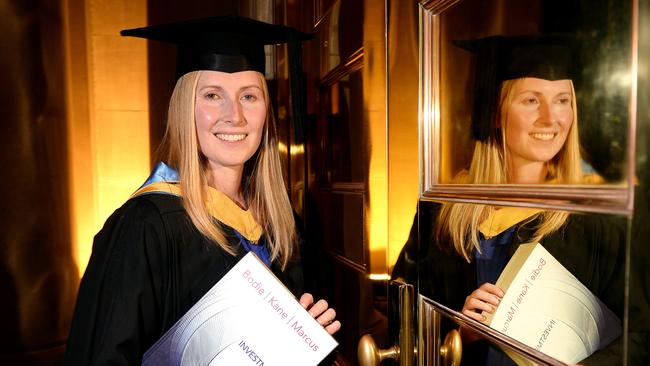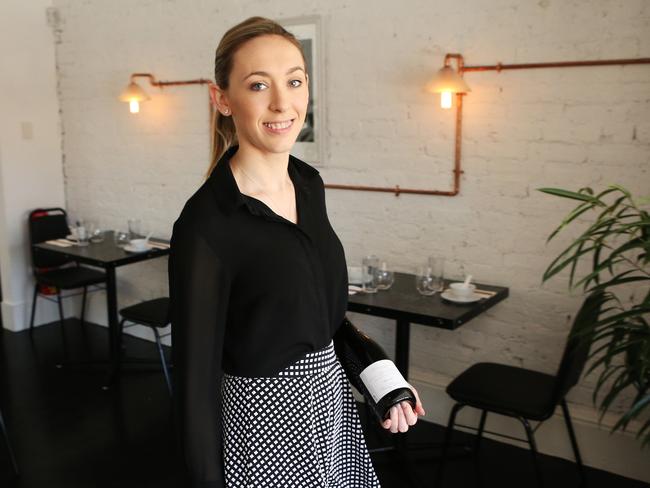Don’t force your kids to go to uni just for the prestige, because they’re not guaranteed a job out of it
GONE are the days when a bachelor degree would automatically get you your dream job, so there’s no point pushing unwilling kids to go to uni, experts say.

Careers
Don't miss out on the headlines from Careers. Followed categories will be added to My News.
GONE are the days when a bachelor degree alone guaranteed your dream job.
School leavers are urged to either commit to lifelong study or consider vocational education to be where the jobs are.
While a degree qualifies graduates for entry-level professional work, progression is limited as mid-level white collar jobs are slashed.
SkillsOne chief executive Brian Wexham said parents and schools often pushed students into university for prestige even though the jobs weren’t always there.
“They end up going to university and come out, if they finish the course, with a degree that isn’t really relevant, they can’t get a job and they don’t have a skill,” he said.
“I don’t hear anybody talking about how we need more lawyers.
“One of the greatest shortages we have is in bricklaying.”
He said carpentry, childcare and hospitality were also in demand and offered entrepreneurial opportunities for young people.
“Guys and girls are able to set up their own business and by the age of 25 be earning really good money and have flexible hours,” he said.
“With a degree, you don’t actually start earning good money until you are 30 or 31.”

Graduate Careers Australia policy, strategy and stakeholder relations adviser Bruce Guthrie said there was still value in a bachelor but an increasingly qualified labour market meant more competition for work.
“Thirty years ago, people with a bachelor degree were walking into really good jobs and year 12 was entry-level,” he said.
“Generally speaking, a bachelor degree is entry level now. You don’t come out of university with your bachelor degree and walk straight into middle management.”
GCA report Graduate Destinations 2014 revealed just 68.1 per cent of last year’s bachelor graduates available for fulltime work were employed fulltime within four months of finishing.
This was down from 71.3 per cent a year earlier and down from 87.8 per cent 25 years earlier.
Of graduates in fulltime work, 65 per cent were in a professional occupation while one in five were in clerical, sales or service roles, which may or may not have been related to their field of study.

Randstad global chief executive Jacques van den Broek said repetitive white-collar jobs like first-level banking and retail managers were “being slashed as we speak”.
“These people either qualify themselves and move up in the world or they move down but then squeeze out the people that are lower,” he said.
School leavers should choose either an apprenticeship or commit to lifelong learning and postgraduate study.
“It’s still the sentiment to land a good white-collar administrative job although if you’re capabilities are to get to mid-level education in this field, that’s probably not a good way to go,” he said.
“If you are intellectual and have a bigger horizon, then we would advocate getting yourself as well-educated as you can. (Otherwise) you’d better look for manual jobs.”
Jessica Martin, 24, left school in year 10 to study a Certificate IV in Hospitality Supervision, Diploma of Hospitality Management, Advanced Diploma of Hospitality Management and a Diploma of Events Management.

She represented Australia in restaurant service at the 2013 WorldSkills Competition in Germany, is an Ambassador for the Australian Training Awards and turned down a job offer at the Fat Duck in London to work in Copenhagen instead.
“When I left school, a lot of people said to me I need to go to university or I won’t get high up in my job but I am doing just fine,” she said.
Originally published as Don’t force your kids to go to uni just for the prestige, because they’re not guaranteed a job out of it


